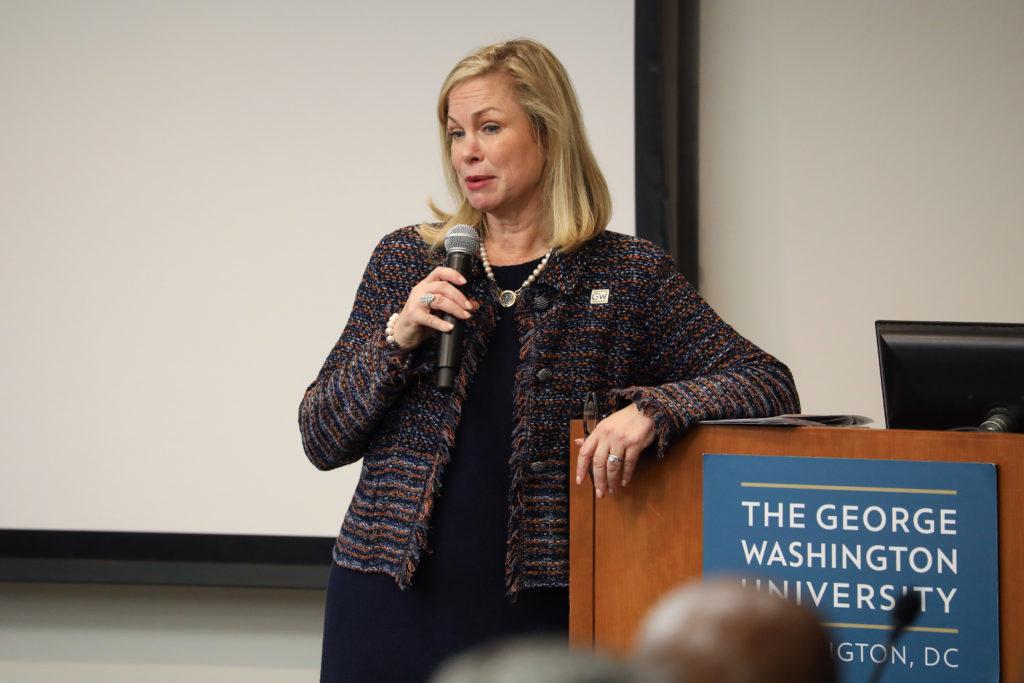As tuition at GW and other private universities continues to rise, some of the school’s neediest students may soon receive more financial aid from the federal government.
Congress increased the amount of money available for the Pell Grant by passing the College Cost and Reduction Act Sept. 7. Pell Grants are sums of money given by Congress for low-income students.
Officials from GW’s financial aid office said this act would not affect the amount of need-based aid available for GW students through the University.
“Everything is still new,” said Director of Student Financial Assistance Dan Small. “I don’t see this as really changing too much of what we did in the past. The neediest students will get an increase (in financial aid overall), which is always a good thing.”
Along with the consistency that GW’s fixed tuition offers, Small said even a small increase in grant money could help students feel more comfortable paying for GW.
“I think the difference may be that for those who are currently enrolled, it will probably help them to say, okay, I can stay,” Small Said. “Since tuition is not increasing, there may be students who are struggling, but this extra money would help them to stay.”
Over the next five years, the maximum award through a Pell Grant will increase from $4,310 to $5,400 by 2012, the largest increase in federal aid since World War II. The act comes at a time when the average student will be $19,000 in debt upon graduation, according to the Department of Education.
About five million students receive a Pell Grant each year, and approximately 1,000 GW students received Pell Grants for the past academic year, Small said. This number represents about one quarter of the GW students who receive financial assistance.
For the first time, the U.S. News and World Report included the percentage of Pell Grant recipients in its 2008 college rankings. The report states that 9 percent of GW students receive Pell Grants, one of the lowest percentages on the listing of national universities. GW is No. 1 on another U.S. News list of average student financial assistance packages offered to students.
“Students should be challenged in the classroom, not in the financial aid office,” Sen. Mark Pryor (D-Ark.) said in a teleconference. “That’s why I am pleased by Congress’ new commitment to help students overcome tuition hurdles so they can receive a higher education and compete in today’s global economy.”
This act not only increases the maximum available amount for a Pell Grant, but also changes the eligibility requirements for the grants. By increasing the income cutoff, more students will qualify for the grant.
“Every little bit helps, no matter where it is from,” Small said.
The extra money for the Pell Grants will come from profits from the Stafford Loan Program. Congress is cutting back the amount of federal subsidiaries it typically gives to private banks and loan lenders by about $20 billion in the next five years.
Some loan lenders said they will no longer offer these types of loans. They may be forced out of business or they will have to decrease their services to students if they receive less money.
Those already receiving the grant will not be affected since the changes in the program have not taken place yet.
“Students will always find a source for Stafford loans,” Small said. “It’s not like the loan program is going away. Some of the profits are just being diverted into financial aid.”
Senior Hillary Johnson said a friend of hers had to transfer out of GW when she lost her Stafford loan.
“It’s the most expensive school in the nation (and) it’s important to have more students than just the elite class,” Johnson said. “There’s a lot the school has to offer, so it shouldn’t be so exclusive.”
The bill also cuts back on the amount of student loans owed by graduates who work in public service professions such as firefighting, teaching and the police for at least 10 years.
Johnson said this would be an attractive incentive program for many undergraduate students.
“I think the principle of such a program is good,” she said. “Currently if you want the government to help you, you go into the military. It’s nice to have other public service options.”
Junior Katerina Begetis received a Pell Grant. She said was disappointed that she will graduate before it reaches its maximum amount, in 2010.
Junior Russom Woldezghi said he received the grant last year, but he thought he missed the deadline for applying for it this year.
“I’m trying to avoid taking out too many loans,” he said.
Michael Moffett contributed
to this report.





